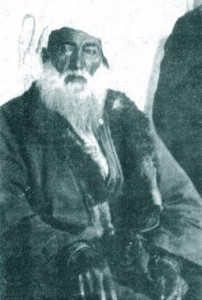
By Solin Hacador:
It is 88 years since Sheik Said (1860-1925), leader of the 1925 Kurdish Rebellion and his 46 adherents were executed by the Turkish state on 29 June 1925. 88 years have passed but we Kurds still do not know where is Sheik Said and his adherents’ burial place!
This is considered a perpetual punishment given by the Turkish state to the families of the victims and Kurds in general. Therefore, 29 June is considered one of the dark and painful days in Kurdish history.
As the years go by, the anniversary of this traumatic death is still very painful for us and we cannot get relieved from this constant pain until Turkish State provide us with the full information.
On death anniversary of Sheik Said, he and his adherents are remembered with such great respect. However the pain is remained forever.
Death can be accepted within years if it takes place naturally. The death of Sheik Said and his 46 adherents was not natural. This traumatic issue is worsening our faith in Turkish justice which we Kurds can never rely on at any stage.
Kurdish history is full of massacres, uprisings, imprisonment, torture etc, at the hands of the Ottomans and continued by later Turkish states.
The Sheik Said rebellion of 1925 was a significant development in Kurdish nationalism. Sheik Said condemned the rule of Young Turk’s regime who occupied Kurdish lands and persecuted and oppressed Kurds violently. He rose up against the Young Turks with his well-organised 15,000 Kurdish adherents.
By the late March 1925, the Turkish army started a three-pronged attack on the rebel area, using air power to destroy both rebels and civilians. On those days people from the towns of Silvan, Hani, Palu, Piran, and Lice forced to flee.
The Young Turk regime used barbaric methods towards the Kurdish rebellion and Kurdish civilians, destroying 206 villages, burning 8758 houses and killing 15,200 people, including women and children. There is no doubt that the repression of 1925 was accomplished with a brutality which echoed the Armenian Massacre 1915.
On 28th June 1925 Sheik Said was sentenced to death with his 47 adherents, including his son, by Turkish Court of Diyarbakir (Amed). One sentence was commuted to 10 years imprisonment for being under age (15 years old). The following day, on 29th June 1925, Sheik Said and his adherents were executed in the Mountain Gate (Dağ Kapı) of Diyarbakir. The bodies were not given to their families and the families were never provided with information about their burial place. Not even their personal belongings were given to their families. Sheik Said’s testament was placed under the control of Ahmet Süreyya, the head of public prosecutions, and this also was not given to his family.
Dr.Robert Olson, Professor of Middle East History and Politics at University of Kentucky, in his article, ‘The Kurdish Rebellions of Sheikh Said (1925), Mt. Ararat (1930), and Dersim (1937-8): Their Impact on the Development of the Turkish Air Force and on Kurdish and Turkish Nationalism’, stated:
“…rebellions also contributed to the development of the Turkey’s air force (TAF) which was to be used as an instrument to control, suppress and eradicate Kurdish nationalism…”
The lawyer for Sheik Said’s family, Mr. Sitki Zilan, submitted a petition in 2009 to the Interior Ministry of Turkey seeking to find the grave of Sheik Said and his adherents but until now he has had no response.
It is quite interesting that the graves of both Sheik Said and Seyid Riza, the leader of 1937-1938 Dersim Rebellions, are secret. There is clear evidence that Turkish State does not want to give the graves to their families and Kurds but for how long can they hide the truth?
It is beyond question that all the evidence is archived in the Turkish Interior Ministry. The Turkish state had better face up to its crimes to against Kurds, accept its own history and provide Kurds with the graves of their martyrs.
People often hope that an anniversary will end one chapter of life and put certain feelings to rest. But we Kurds cannot rest until we are provided with full information.
Copyright © 2013 Kurdistantribune.com
.jpg)




Ms. Hacador, I congratulate on a job well done. I believe you are one of the best Kurdish journalists in the world. I am pleased that KT has been publishing your contributions to our knowledge of our proud Kurdish nation. Yet, I was surprised to see that Sheikh Said lived between 1880-1925. This means he was only 45 years old when he was murdered. However, according to most other sources he was born in 1865. This looks like a minor mistake that should be corrected.
Editorial typo – now corrected, thank you Dr Koohzad
It is pity to put such a distinguished figure like sheikh Saeed, in to the restricted domain of Kurdish ethnic identity. The history of Sheikh Said’s rebellion is apparent and shiekh’s opposition to Young Turks and his desire to bring back Ottoman Caliphate and how Alevis (sponsor of Kemalism) then took the revenge from shiek and his follower.
Sheikh said and his men dont rebellied for a kurdisch state they rebellied for islam and islamic state and law !!!